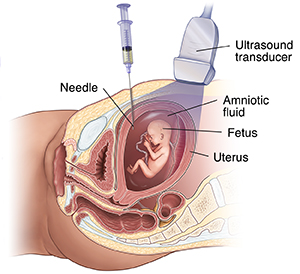Amniocentesis is a prenatal test that helps you learn if your baby has genetic problems. The test is most often done between 15 and 20 weeks of pregnancy. Talk with your doctor to see if this test is right for you.
Should you have amniocentesis?
You may want to think about having an amniocentesis if:
-
You’re age 35 or older.
-
There’s a history of inherited (genetic) problems in your family.
-
You have another child with a genetic problem.
-
An ultrasound or blood test has shown that the baby may have a birth defect or other health problem.
How is amniocentesis done?
-
The baby is located with ultrasound (sound waves that make an image on a screen).
-
The belly is cleaned with a special soap or solution.
-
A thin needle is put into your uterus, through your belly. The doctor keeps the needle from touching the baby by watching the screen.
-
The needle is used to remove a small amount of amniotic fluid from your uterus. Your body will make more fluid to replace what was taken.
-
You can go home right after the test. But you may need to take it easy for a day or so.
What are the possible risks?
This test is considered safe. But there are some possible risks. These include:
-
Cramping, spotting, or leaking amniotic fluid.
-
Infection in the uterus.
-
Pregnancy loss (miscarriage). This is rare.
-
The needle coming into contact with the baby. This is rare.
When to contact your doctor
Contact your doctor right away if you have:
-
Severe pain or cramping.
-
Vaginal bleeding (spotting).
-
Fever or chills.
-
Fluid leaking from your vagina.
Getting test results
You’ll get your test results in about 2 weeks. Most results are normal. Even if yours aren’t, it doesn’t always mean there’s a problem. But this will depend on what your doctor is looking for with amniocentesis. You and your doctor can talk about other tests or special care you may want.


